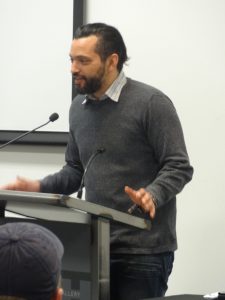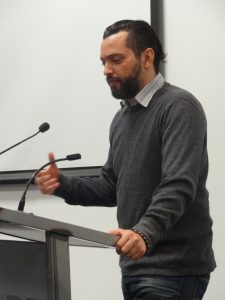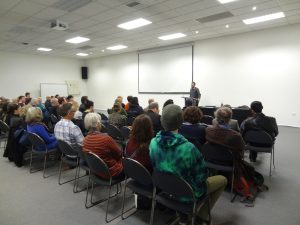Muslims ‘Belonging’ to Muslims ‘Becoming’ Public Talk
On 29 June 2017, Dr Yassir Morsi, politics lecturer from La Trobe University and the Centre’s 2017 Visiting Scholar, spoke on Muslims, migration, belonging and becoming.
With a nod to his birth in the UK to secular Egyptian parents and his later upbringing in Australia, a migration taken to escape Britain’s racism, Morsi explained his conscious act to ‘become’ more Muslim after 9/11. This ‘flirtation with Islam that was anti-Western’ included attending mosque and using Muslim phrases. But Morsi was left with the lingering problem of where he and other Muslims belong. For years, he has grappled with this issue.
In his talk he pointed to three strategies in which he and other Muslims have sought to belong in ‘white’ Australia. The first of these is what Morsi terms an ‘act of confession’. It encompasses a lack of secrecy, love of democracy and espousal of typical Australian aspects such as love of rugby and speaking with an Australian accent. In other words, Morsi took on the performance role of being Australian.
The second strategy is that of the ‘moderate mask’, in which excessive pleasantries and anger are repressed because of their ability to trigger anxieties. Morsi spoke of allegations that he supported radicalism and blamed Australia for terrorism, simply because he would try to explain the complexity of the world and point to inequalities that mean ‘Australia is not the same place for everyone’. In such an environment, Morsi struggled to find an authentic voice for the book he was writing. He therefore ended up writing about the process of not being able to write.
The third strategy is that of self-policing, involving difficult conversations within the Muslim community and being appropriately critical. Morsi admitted that as a male he has certain privileges denied African Muslim women, even though many females of colour are leading feminist movements. But even within Muslims spaces, Muslims find it hard to have conversations that do not sap their energies or comment on issues such as gender violence within the Muslim community for fear that this enhances racism towards them.
Frequently called upon to explain Muslim practices and ways of thinking, Morsi identified three issues he is continuously asked about: polygamy; homosexuality; and whether he sees himself as progressive or conservative. Not having opinions on these matters has left Morsi and many Muslims being perceived as either moderate or radical with no in-between space to define themselves or be non-political.
Throughout his talk Morsi drew upon several stories from his book Radical Skin, Moderate Masks to convey his journey from belonging to becoming. These include an Australian TV producer approaching him for advice on a forthcoming series in which 10 diverse Muslims are placed for 10 days in a Big Brother environment without the evictions. Morsi also likened Australia to nightclubs with bouncers deciding who belongs and who does not.
Held at the public auditorium of the Dunedin Public Art Gallery, Dr Yassir Morsi’s talk attracted a crowd of around 60 folk and generated a sustained question and answer session.




